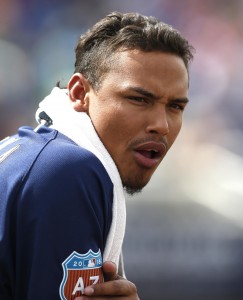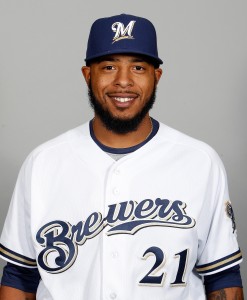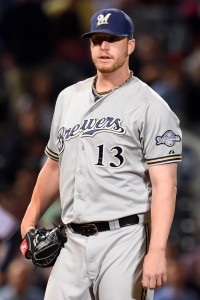There’s been a great deal written about the reasons behind Jonathan Lucroy’s decision to invoke his no-trade clause in order to veto a trade to the Indians, and Lucroy himself has elected to set the record straight, as told to ESPN.com’s Robert Sanchez. The entire explanation is well worth a look for any fan, but Cleveland fans feeling jilted by Lucroy will especially want to take a look to read his own take.
When first informed by Brewers GM David Stearns that he’d been traded, Lucroy said he wasn’t informed which team had struck a deal to acquire him, as medical information needed to be examined before anything could be finalized. He assumed, however, that he’d been dealt to a club that didn’t appear on his no-trade list, as he wasn’t asked about waiving the clause at the time. When Lucroy’s agent, Doug Rogalski, learned it was Cleveland who had the agreement, he called Lucroy to inform him. As Lucroy says…
“I was surprised, but I wanted to keep an open mind. Great team. Competitive team. There’s a real chance to win. Doug called Chris Antonetti, the Indians’ president. There was one thing we wanted to know: What was my future with the Indians? We knew Cleveland already had a good catcher, Yan Gomes, who’s injured right now. He’s getting paid more than me, and he’s younger than me. We knew they’d probably want him catching almost every day next year. Heck, if I were the general manager in Cleveland, I’d want Gomes catching every day.
We were right. Antonetti told Doug that the Indians couldn’t make any promises on me catching next season. There was no way they’d drop the team option, either, because I’m pretty inexpensive in 2017. I don’t blame them. I would have been mostly at first base and designated hitter.”
Lucroy stresses that the decision was not because of any negative feelings he harbors toward the city of Cleveland, Indians fans or the Indians organization. He, in fact, was sure to state that he actually respects the organization even more now due to Antonetti’s honesty: “He could have lied to my agent and said I’d play catcher every day next season. … He told the truth. I’m thankful for that.”
Lucroy calls the decision to reject the trade purely economic, believing that teams wouldn’t place as high of a value on him as a free agent if it had been more than a calendar year since he’d regularly been catching games. He also expressed a basic love for the position of catcher — his regular spot on the diamond since he was 12 years old — and spoke about the difficulty he had when thinking of not manning the spot on a near-daily basis in 2017. Lucroy goes on to discuss the uneasiness of waiting to find out if he’d be traded, the impact that the talks had on his wife and young daughter, the emotion he felt in his final at-bat as a member of the Brewers and the relief he felt not only from being traded to a contending club but one that is close to his offseason home in Louisiana. “I know I had nothing to do with the Rangers getting to where they are now, but I want to have a lot to do with finishing the job,” he closes.
Again, readers are strongly encouraged to check out Lucroy’s full statements, as they provide a behind-the-curtain look at the thoughts, emotion and stress that fans and the media alike will often take for granted when discussing trades.




